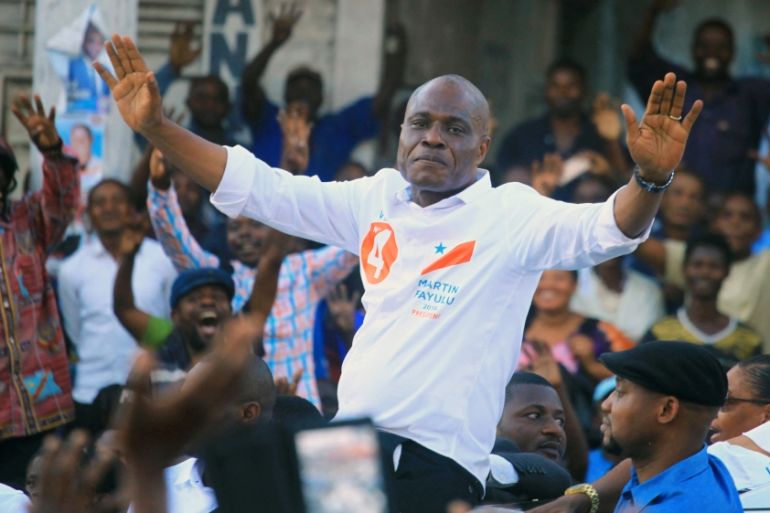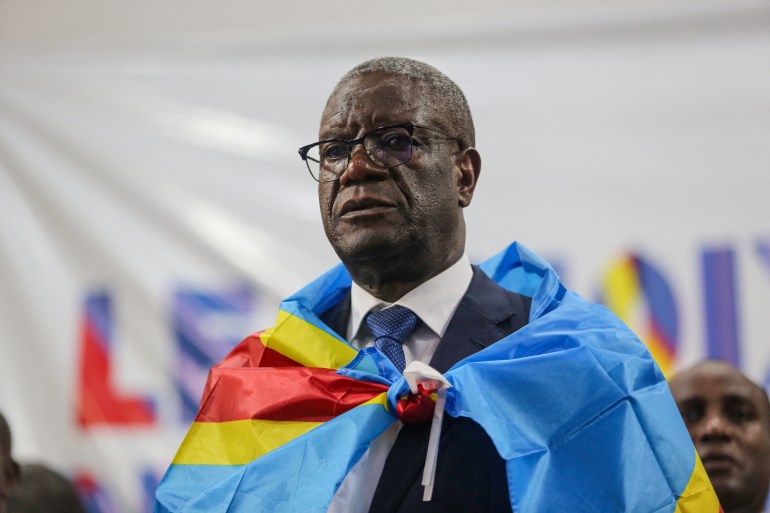DR Congo opposition discuss coalition candidate, fair election in Pretoria
The Pretoria meeting comes ahead of the December 20 general election in which President Tshisekedi is seeking re-election.

Representatives of the Democratic Republic of Congo’s main opposition parties began talks this week in Pretoria to decide on a potential joint candidate to challenge President Felix Tshisekedi in the December 20 general election.
The electoral commission has approved a list of 25 candidates to face Tshisekedi who is seeking a second five-year term.
Keep reading
list of 4 itemsIndia Lok Sabha election 2024 Phase 5: Who votes and what’s at stake?
Key takeaways from day 18 of Donald Trump’s New York hush money trial
Chad’s Mahamat Deby confirmed as winner of disputed presidential election
Campaigning for the election in the DRC, the world’s largest producer of battery material cobalt and a major copper producer will start on November 20.
Opposition candidates include Tshisekedi’s old rivals such as Martin Fayulu, a 66-year-old former oil executive who came second in the disputed 2018 presidential vote which he claimed to have won, and first-timers such as Congo’s renowned Nobel Peace Prize-winning gynaecologist Denis Mukwege. Moise Katumbi, the former governor of mineral-rich Katanga province and chairman of football club TP Mazembe is also in the running.
Fayulu told the Reuters news agency that discussions in the South African capital were to ensure that the elections were transparent. “The question of a joint candidacy will certainly be discussed in due course,” he said, adding that the main concern was to agree ground rules for holding peaceful elections.
A divided opposition field could be an advantage for Tshisekedi in a single-round election that requires a simple majority of the vote to win.
Before the 2018 presidential election, Fayulu was chosen as the joint opposition candidate in a deal that at the time included Tshisekedi, and Vital Kamerhe, currently the vice prime Minister and minister of the economy. However, Tshisekedi and Kamerhe pulled out of the deal a day after it was agreed following what they said were protests from their supporters, and Tshisekedi went on to win the disputed vote.

Herve Diakiese, a spokesperson for millionaire businessman Katumbi said there was a need to bolster one opposition candidate.
“We’re going to look for a leader, line up behind him and make him president,” Diakiese said. “Without discriminating against the others, the three names that stand out are Denis Mukwege, Moise Katumbi and Martin Fayulu.”
The Katumbi campaign had said in an emailed statement on Monday that “Tshisekedi and his cronies in Kinshasa [have] robbed us of the hope he promised when they took office in 2019”.
There are concerns about the conduct of the election as the Central African country grapples with unending violence in its restive region from multiple armed groups including the dreaded M23 group, which the European Union, United Nations experts and Kinshasa say is being backed by Rwanda. Kigali has denied the allegations.
Opposition parties have also raised alarm and warned that the election could be flawed, alleging irregularities during the voter registration period orchestrated by the national election commission to favour Tshisekedi’s ruling coalition. The commission has denied the accusation promising a fair election.
Albert Moleka, an adviser to Mukwege said the joint candidacy must be based on programme, but the key to a fair election was for the opposition and civil society to be organised and monitor the vote.
“If we all go our own way, with fraud in the offing, can we win? How can we mobilise witnesses? How can we get around?” Moleka said.